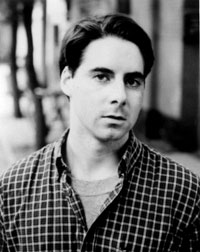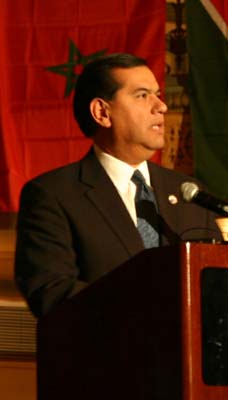2006.05.20: May 20, 2006: Headlines: Figures: COS - China: Writing - China: San Fransisco Chronicle: RPCV Peter Hessler says: China's fast-changing economy has displaced millions of people, sparking a huge migration from farms and small towns to big cities, and from failing, state-owned enterprises into private businesses
Peace Corps Online:
Directory:
China:
Special Report: China RPCV and Author Peter Hessler:
2006.05.20: May 20, 2006: Headlines: Figures: COS - China: Writing - China: San Fransisco Chronicle: RPCV Peter Hessler says: China's fast-changing economy has displaced millions of people, sparking a huge migration from farms and small towns to big cities, and from failing, state-owned enterprises into private businesses
RPCV Peter Hessler says: China's fast-changing economy has displaced millions of people, sparking a huge migration from farms and small towns to big cities, and from failing, state-owned enterprises into private businesses

"This is not a political generation. They tend to be very economically minded. In some ways, I sympathize with them. They went through a lot of political problems,'' he said, referring first to the Cultural Revolution when the new generation's parents and grandparents were traumatized by thuggish Red Guards, and later the shootings of reform-minded students in Beijing's Tiananmen Square in 1989.
RPCV Peter Hessler says: China's fast-changing economy has displaced millions of people, sparking a huge migration from farms and small towns to big cities, and from failing, state-owned enterprises into private businesses
Finding their niche in a changing China
Author tells how young people adjust to turbocharged economy
David Armstrong, Chronicle Staff Writer
Saturday, May 20, 2006
China's fast-changing economy has displaced millions of people, sparking a huge migration from farms and small towns to big cities, and from failing, state-owned enterprises into private businesses. Contained within that migration are millions of personal stories -- compelling material for writers like Peter Hessler, whose new book, "Oracle Bones: A Journey Between China's Past and Present,'' views China through the lives of individuals.
Hessler, a Peace Corps volunteer turned journalist who writes from Beijing for the New Yorker, wrote a critically acclaimed first book in 2001: "River Town,'' his memoir about teaching college English in the Yangtze River city of Fuling in the 1990s. In "Oracle Bones,'' he profiles -- among others -- several of his former Fuling students now trying to make their way in the turbocharged economy of the new China. Their vivid, funny and sometimes poignant experiences inform many of the most affecting passages.
The "oracle bones" of Hessler's title are ancient turtle bones and shells inscribed with an early form of Chinese writing and used to foretell the country's future. Hessler explains how the long, uninterrupted tradition of Chinese writing helped shape the country's character. In the process, he relates a heartbreaking tale of what befell a leading scholar of the bones during China's Cultural Revolution of the 1960s and '70s, and shows how China's break with orthodox socialism in favor of state-sponsored capitalism is shaping the country's future.
Hessler, who speaks Mandarin and has lived in China for 10 years, was quietly confident and serious in an interview at San Francisco's Hotel Monaco. Unlike writers who embrace reams of statistics and charts to tell a big story, he appears skeptical that China can best be understood through numbers -- especially because some of the data bandied about can be unreliable.
Facing challenges
"I heard it said that there were more construction cranes in China than in the rest of the world combined,'' he said -- a slight frown showing he doubted it. "I came to think there are more statistics in China than in the rest of the world combined.''
In "Oracle Bones,'' Hessler recounts what happens when Emily, a former student, set off to Shenzhen, a raw border boomtown near Hong Kong.
Emily followed her sister to Shenzhen, forgoing the job she had studied for -- high school teacher -- to work in a factory, where she had a chance to make more money. Conditions in Shenzhen, where U.S., Taiwanese and Hong Kong companies do low-cost outsourcing (and, increasingly, high-tech research and development) proved grim, especially at the outset. The factory work was repetitive and dull and Emily lived in a crowded company dormitory with a strict curfew and lights-out rule.
"There's not a lot of long-term thinking in China,'' said Hessler, a 37-year-old Missourian who has resided in Beijing since 1999. "The idea is, if you have an opportunity, take it.''
Emily's story eventually took a happier turn. She stood up to an abusive boss, built a nest egg and left Shenzhen for a teaching job working with disabled children. Hessler says that, with perseverance, other workers can master their brave new worlds, too.
Hessler doesn't pull punches in describing bleak living and working conditions, but he is not a muckraker of the new China, either on the page or in conversation.
"To them, it's a better way of life,'' he said, referring to young Chinese who take humble jobs in new cities, work hard to earn raises, salt away money and use it to buy small first apartments and gain entree to the evolving market economy. "I don't think it's my place as an American to tell them that's not true.''
Young people not political
Hessler has a that's-the-way-it-is tone when he discusses the loss of U.S. manufacturing jobs to Chinese outsourcing, and the determination of Chinese workers in their 20s and 30s to desert the countryside and follow the money to China's sprawling boomtowns.
"In the end, not a lot of Americans want to work in shoe factories,'' he said. "That's why we occupy other niches in the global economy.''
Of young Chinese, he says, "This is not a political generation. They tend to be very economically minded. In some ways, I sympathize with them. They went through a lot of political problems,'' he said, referring first to the Cultural Revolution when the new generation's parents and grandparents were traumatized by thuggish Red Guards, and later the shootings of reform-minded students in Beijing's Tiananmen Square in 1989.
Hessler says that the Chinese government's control of media, including the Internet, is an impediment for today's would-be reformers. But he says it's a problem that can be surmounted, and says the recent plunge of Silicon Valley Internet companies Yahoo and Google into the Chinese market will ultimately promote a freer flow of information.
"It's easy to criticize Yahoo or Google,'' he said. "They're easy targets.''
In "Oracle Bones,'' he cites another former student -- who took the English name William Jefferson Foster -- as an example of a motivated person who figured out how to glean forbidden information from the Voice of America and foreign Web sites.
"You don't have to be that savvy to get past the firewalls. The Internet is never going to be controlled, or even close to it.''
Lack of curiosity
However, ordinary Chinese are sometimes guilty of a lack of curiosity, he says, and that -- combined with government restrictions -- slows the flow of critical information.
"It's not always a top-down thing. The people who try to devise ways (of getting around censorship) have had to push. There are certain people who try, but they are very, very few.''
Hessler acknowledges that continuing tension over the huge U.S. trade deficit with China, the country's supposedly undervalued currency, and Beijing's and Washington's suspicion of each other's military ambitions make for a troubled relationship. Both countries, he said, will have to adjust before the relationship can improve.
"China is one country we don't control,'' he said. "You can't change a country that you don't understand. That's the lesson of Iraq.''
As for China, he said, "China at some point needs to move beyond Opium War victimization.'' Only then can it become a confident 21st century nation -- and stand on equal footing with the United States.
E-mail David Armstrong at davidarmstrong@sfchronicle.com.
When this story was posted in May 2006, this was on the front page of PCOL:





Peace Corps Online The Independent News Forum serving Returned Peace Corps Volunteers
 | Help Peace Corps get its full Appropriation
Senators DeWine, Feinstein, Santorum, and Durbin are asking their colleagues to join them in signing a letter to Senate Appropriations leaders to fully fund the President's FY07 request for the International Affairs Budget, including a full appropriation for the Peace Corps. Forty-five Senators have already signed on. Here's how you can help. Please make your call by May 16. |
 | The Peace Corps Library
The Peace Corps Library is now available online with over 40,000 index entries in 500 categories. Looking for a Returned Volunteer? Check our RPCV Directory. New: Sign up to receive PCOL Magazine, our free Monthly Magazine by email. Like to keep up with Peace Corps news as it happens? Sign up to recieve a daily summary of Peace Corps stories from around the world. |
 | PC evacuates East Timor, hopes to return
Volunteers serving in East Timor have safely left the country as a result of the recent civil unrest and government instability. Latest: The Peace Corps has informed us that they are monitoring the security situation on a daily basis and that it is the intention of the Peace Corps to return to East Timor if the security situation improves. |
 | It's Official: Vasquez nominated to FAO
Exactly one week ago we predicted that Director Vasquez would soon be receiving a major ambassadorship. Today the White House confirmed that Vasquez will be the new Representative to the United Nations Agencies for Food and Agriculture replacing Tony Hall.
PCOL Comment: Director Vasquez, let us be the first to thank you for your service to the Peace Corps, congratulate you on your new appointment, and wish you good luck in your future endeavors. Although we have had our differences over the years and we opposed your nomination in 2001, we think you are leaving a solid legacy of accomplishment and have served the Peace Corps well.
Initiatives and Accomplishments: Vasquez's major initiatives and accomplishments since becoming Peace Corps Director include: an agreement with Mexico in 2003 to host volunteers, sending RPCVs to work domestically in Hurricane relief after Katrina, emphasis on recruitment of minorities and of community college graduates, upgrading Peace Corps' infrastructure especially IT upgrades in the online application tracking process and the Volunteer Delivery System, an emphasis on safety and security of volunteers including the creation of a Situation Room at Peace Corps Headquarters, modifying Peace Corps' "Five Year Rule" for employment, and the expansion of the Peace Corps to its highest level in 30 years. He is the third longest serving Peace Corps Director after Loret Ruppe Miller and Sargent Shriver. |
 | Interview with a Hit Man
RPCV John Perkins says that for many years he was an "economic hit man" in the world of international finance whose primary job was to convince less developed countries to accept multibillion dollar loans for infrastructure projects that left the recipient countries wallowing in debt and highly vulnerable to outside political and commercial interests. In this exclusive interview for "Peace Corps Online," Colombia RPCV Joanne Roll, author of Remember with Honor, talks to Perkins about his Peace Corps service, his relation with the NSA, "colonization" in Ecuador, the consequences of his work, why he decided to speak out, and what his hopes are for change. |
 | Peace Corps stonewalls on FOIA request
The Ashland Daily Tidings reports that Peace Corps has blocked their request for information on the Volkart case. "After the Tidings requested information pertaining to why Volkart was denied the position — on March 2 — the newspaper received a letter from the Peace Corps FOIA officer stating the requested information was protected under an exemption of the act." The Dayton Daily News had similar problems with FOIA requests for their award winning series on Volunteer Safety and Security. |
 | PCOL readership increases 100%
Monthly readership on "Peace Corps Online" has increased in the past twelve months to 350,000 visitors - over eleven thousand every day - a 100% increase since this time last year. Thanks again, RPCVs and Friends of the Peace Corps, for making PCOL your source of information for the Peace Corps community. And thanks for supporting the Peace Corps Library and History of the Peace Corps. Stay tuned, the best is yet to come. |
 | History of the Peace Corps
PCOL is proud to announce that Phase One of the "History of the Peace Corps" is now available online. This installment includes over 5,000 pages of primary source documents from the archives of the Peace Corps including every issue of "Peace Corps News," "Peace Corps Times," "Peace Corps Volunteer," "Action Update," and every annual report of the Peace Corps to Congress since 1961. "Ask Not" is an ongoing project. Read how you can help. |
 | PC announces new program in Cambodia
Director Vasquez and Cambodia's Deputy Chief of Mission Meng Eang Nay announced a historic new partnership between the Peace Corps and the Kingdom of Cambodia that will bring volunteers to this Southeast Asian country for the first time. Under King Norodom Sihamoni and Prime Minister Hun Sen, Cambodia has welcomed new partnerships with the U.S. government and other U.S. organizations. |
 | Peace Corps suspends program in Bangladesh
Peace Corps Director Gaddi H. Vasquez announced the suspension of the Peace Corps program in Bangladesh on March 15. The safety and security of volunteers is the number one priority of the Peace Corps. Therefore, all Peace Corps volunteers serving in Bangladesh have safely left the country. More than 280 Peace Corps volunteers have served in Bangladesh since the program opened in November 1998. Latest: What other newspapers say. |
 | Invitee re-assigned after inflammatory remarks
The Peace Corps has pulled the invitation to Derek Volkart to join the Morocco Training Program and offered him a position in the Pacific instead after officials read an article in which he stated that his decision to join the Peace Corps was in "response to our current fascist government." RPCV Lew Nash says that "If Derek Volkart spoke his mind as freely in Morocco about the Moroccan monarchy it could cause major problems for himself and other Peace Corps volunteers." Latest: Volkart reverses stance, takes new assignment in Paraguay. |
 | RPCV admits to abuse while in Peace Corps
Timothy Ronald Obert has pleaded guilty to sexually abusing a minor in Costa Rica while serving there as a Peace Corps volunteer. "The Peace Corps has a zero tolerance policy for misconduct that violates the law or standards of conduct established by the Peace Corps," said Peace Corps Director Gaddi H. Vasquez. Could inadequate screening have been partly to blame? Mr. Obert's resume, which he had submitted to the Peace Corps in support of his application to become a Peace Corps Volunteer, showed that he had repeatedly sought and obtained positions working with underprivileged children. Read what RPCVs have to say about this case. |
 | Why blurring the lines puts PCVs in danger
When the National Call to Service legislation was amended to include Peace Corps in December of 2002, this country had not yet invaded Iraq and was not in prolonged military engagement in the Middle East, as it is now. Read the story of how one volunteer spent three years in captivity from 1976 to 1980 as the hostage of a insurrection group in Colombia in Joanne Marie Roll's op-ed on why this legislation may put soldier/PCVs in the same kind of danger. Latest: Read the ongoing dialog on the subject. |
Read the stories and leave your comments.

Some postings on Peace Corps Online are provided to the individual members of this group without permission of the copyright owner for the non-profit purposes of criticism, comment, education, scholarship, and research under the "Fair Use" provisions of U.S. Government copyright laws and they may not be distributed further without permission of the copyright owner. Peace Corps Online does not vouch for the accuracy of the content of the postings, which is the sole responsibility of the copyright holder.
Story Source: San Fransisco Chronicle
This story has been posted in the following forums: : Headlines; Figures; COS - China; Writing - China
PCOL32841
32






















